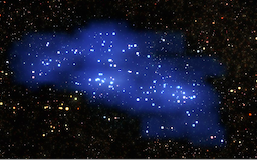Beneath the amazing colors of the beautiful images collected by telescope facilities in space and on remote mountaintops lie numbers, and lots of them. These data contain the scientific information astronomers need in order to reveal the physical properties of the Universe and the laws that govern its function. Recent advances in detector technologies and large focal plane CCD arrays enable astronomers to efficiently monitor a hyperspectral/multiwavelength view of the sky, thus opening the last unexplored window, the one of time domain in short time scales. This ability of daily monitoring big swaths of the sky over extended periods produces astronomical datasets at an astounding rate, revealing the transient and often violent face of the Universe. Hence, researchers need to develop more powerful computational and statistical methods to tackle the data, to get the big picture view out of the underlying science details.
Astroinformatics is primarily focused on developing the tools, methods, and applications of computational science, data science, machine learning, and statistics for research and education in data-oriented astronomy. Early efforts in this direction included data discovery, metadata standards development, data modeling, astronomical data dictionary development, data access, information retrieval, data integration, and data mining in the astronomical Virtual Observatory initiatives.
In 2022 the Institute of Astrophysics formally commenced its investment in this novel and dynamic field of astrophysical data science with its partnership with the Institute of Computer Science of FORTH in the TITAN project. The five year 2.5MEuro TITAN project appointed Dr. Jean-Luc Starck, a world expert in the field, as the ERA Chair holder of Astroinformatics to incept and lead a research program in computational astrophysics and data science, which will couple, transform and expand two major research operations at FORTH - Computer Science and Astrophysics - while rooting an effective bridge between regional research excellence and international missions. Our grand vision is to create a true interdisciplinary, international and multicultural center of excellence for developing the tools, methods, and applications of computational science, machine learning, and statistics for research and education in data-oriented Astronomy. TITAN will fully unlock the potential of FORTH, the Cretan region and Greece through the implementation of a set of measures geared towards: capacity building (expansion of the research program, advanced training opportunities); institutional development and structural change; and intersectoral and international partnership activities in the field of Computational Astrophysics.

